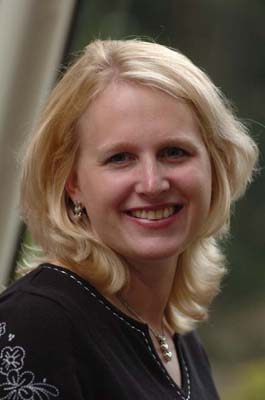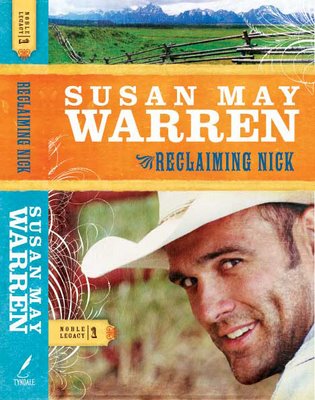 Interviewing Brandt Dodson was a pleasure. Besdies being a great writer and a really nice guy, he's got an AWESOME website. Go visit him at www.brandtdodson.com. While you're there, check out his other books and then order them. They're available at Amazon. And remember to come back this summer when we have another interview with Brandt. He has a lot of great stuff to share with us, and we look forward to it!
Interviewing Brandt Dodson was a pleasure. Besdies being a great writer and a really nice guy, he's got an AWESOME website. Go visit him at www.brandtdodson.com. While you're there, check out his other books and then order them. They're available at Amazon. And remember to come back this summer when we have another interview with Brandt. He has a lot of great stuff to share with us, and we look forward to it!Also remember to stop by our contest page to win a copy of The Root of All Evil.
First, tell us about yourself and give us a plug for your latest release, as well as your upcoming releases.The
Root of All Evil will be released by Harvest House Publishers on January 15th, and is the third (so far) in the Colton Parker Mystery series.
In the story, Berger Hume is a wealthy businessman who is terminally ill when he discovers that he has a son that he never knew existed. Berger hires Colton to find the missing heir.
But this is a Colton Parker novel, so nothing is ever as easy as it would at first appear. Consequently, it isn’t long before Colton finds himself on the end of some very deadly threats, as he seeks to unite father and son. And the threats come from one of Indianapolis’ most powerful and vicious outlaw biker gangs. A gang whose reach extends to the highest level of government.
In Root, I wanted to address the place that money has in our lives, and just who it is that places a premium on it. The bible speaks about money often and the “love” of money in particular. Still, it seems to hold a higher place in our daily thoughts than it ought.
In July,
The Root of All Evil will be followed by
The Lost Sheep.
I come from several generations of police officers, and currently practice as a Podiatrist. However, before obtaining my doctorate I was employed by the Indianapolis office of the FBI which, coincidentally, is exactly where Colton Parker was formerly employed. That is, before he beat a confession out of someone and lost his job.
Was there any particular research you had to do for your current release that our readers might enjoy reading about?
Not so much for
The Root of All Evil as there was for
The Lost Sheep.
I knew from the start, that
The Lost Sheep was going to be set in Las Vegas (rather than Indianapolis) and that was going to require a trip to Sin City if I was going to get my facts straight.
I took a friend along who has lived in Vegas, for help in finding the type of locations that I often use in my books. (ie; back alleys, under bridges, inner city locations, etc.). In one incident, Jeff and I had gone to the Central Division Headquarters of the Las Vegas PD. I was in the back of the building, hanging onto a chain link fence, ten feet in the air, counting the number of squad cars that were parked in the lot. As I was counting, a Las Vegas patrolman pulled up and asked what I was doing. I told him that he wasn’t going to believe me, and he said, “try me”. So I told him and he actually was very helpful.
Many authors say they grow personally with each book they write, discovering pieces of themselves in their characters as they write. Has this happened to you? If so, can you elaborate?Yes it has, and I think that most authors experience this. In fact, Stephen King has said that he writes to “work out” his personal fears. Many other authors will say that their writing is therapeutic and is a major source of satisfaction for them.
In my case, I’ve discovered just how lost I was without Christ (and I’m not talking only in the “eternal” sense).
I write Colton from my own experiences. I haven’t beaten a confession out of someone, nor do I have a rebellious teenage daughter. But I did relate to the world around me in much the same way he does now. It’s only when I look back on him that I realize how much Christ has done for me.
Can you briefly tell us about your writing process? From the germ of an idea to the completed novel? How long does it take you?I’m probably one of the few who actually enjoys the writing process.
I generally will start with a premise and then play the “what if” game.
What if a highly respected school teacher, was involve in something that no one knew about?After I play the game, I naturally look for the spiritual implication. Christianity, after all, defines me and the way I see the world.
Next, I will begin with the first chapter (I never outline) and will write until I am confident that the chapter is as good as I can make it. Then – and only then – will I begin the second one.
Writing is as much a discovery for me as it is for the reader, and the story will often take turns that I didn’t expect. Of course, writing without an outline will necessitate a good bit of
rewriting, but I enjoy that as much as I do the initial draft.
After the manuscript is as good as I can make it, I have my first readers take a look. If they agree on something, then I listen. If not, then I go with my instinct.
I write rather quickly, so the first draft can be done in 3-4 weeks. After than, the
real work begins.
Is writing your full-time job? If so, are you a nine-to-five writer? If not, how do you fit your writing into your schedule?
I still practice Podiatry, which easily runs into 50 hour weeks. Besides that, I am required to teach surgical residents, and I provide services for a wound care center that specializes in hard to heal wounds.
Fitting writing into my life is difficult at times. But I also enjoy it, so it becomes an escape from my “other” life.
I don’t like to write when the kids are still up. I agree with Jerry Jenkins that family must take priority, so I won’t write until after their bedtime. That means I will write 9-11 pm on weeknights, and as much on the weekends as I can manage. I often skip lunch and write on lunch hours too.
My limited schedule is one of the reasons I have to write quickly, especially if I expect to get anything accomplished.
Do you have any particular writing resources you use? Any that apply to suspense in particular?For reference I usually will rely on The Chicago Manual of Style, Roget’s Thesaurus (sparingly!) and Gary Provost’s “Make Your Words Work.
However, for learning purposes, I rely on a lot of books that I have read and reread often.
Patricia Highsmith’s “Writing Suspense Fiction”, any of the writing books by Jack Bickham (especially “Scene and Sequel”), James Scott Bell’s book on plot and structure, and the crime series published by Writer’s Digest. These books deal with criminal investigations, evidence, procedure, forensics, etc.
And, of course, I read the writing instruction books and commentaries by King, Koontz, Noble and others.
My library is very large.
Do you have any future plans for your writing that you’d like to share? Any specific dreams that you’d like to accomplish in the area of writing?I’d like to be able to do this full-time. I am also an eclectic reader, so I tend to be an eclectic writer. I have some contemporary, suspense, and historical novels in me, and I’d like to write those.
I love the suspense genre (mystery also – and the two
are different), but I also like the writing of Anne Tyler. So go figure.
What is the number one thing that you’ve learned from your writing journey?That God is firmly in control.
I wouldn’t be writing now if He hadn’t poured his blessing on me, and I won’t be able to continue if He doesn’t continue to guide me.
It’s been a GREAT ride, watching how God opens some doors and closes others. There have been many instances when I have discovered that He has gone before me, when I thought I was going alone.
Because many of our blog readers are writers, can you share any tidbits about getting published?
You need several things. First, a well written piece of work. That has to be paramount.
Second, you need creativity. By that I am referring to how you submit your work. I didn’t have an agent when I submitted my first novel, but I did go to a writing conference because I knew that I could have a fifteen minute spot to pitch my work to an editor directly. That worked well for me and I was signed by Harvest House.
Third, and probably most important, you need persistence. Rejection is hard, editing is hard, success is hard – none of this is easy. I think it was Churchill who said; “Never, never, never give in”.
How do you see the future of suspense and mystery in the inspirational market?
I think it’s bright. Wide open.
A few years ago, an edgy novel like mine would never have been considered. Now I’m writing an entire series – and I’m not the only one who is doing it.
If you could change one thing about the Christian mystery and suspense market right now, what would it be?To get more “air” play. Sites like “Keep Me In Suspense” go a long way in doing that, but there need to be more. More sites, more discussion, and more writers.
Just as in the secular market, there are a wide range of tastes in the Christian market. Suspense and Mystery fiction have been mainstays for a long, long time and will have devoted readers when they “discover” that the type of fiction they want to read is available.
I’m finding that I’m doing more and more talks at local libraries who tell me that “inspirational” fiction is their fastest growing segment.
What suspense/mystery authors do you read for pleasure?I like the novels of Chandler, Hammett, and Stout. I read Robert B. Parker, Mickey Spillane, and Lawrence Block.
I enjoy Eric Wilson, Mark Mynheir, and John Laurence Robinson. These last three are adding nicely to the CBA market. They’re excellent writers.
Do you have anything you want to leave with our readers? Something the Lord is speaking to you?Write for Him. The Bible says if we delight ourselves in Him, He will give us the desires of our heart.
I’ve found that as I’ve made a conscious effort to grow closer to God, He has changed the desires of my heart, before filling them. The writing/publishing experiences that I’ve had have been truly enjoyable – and eye-opening.
Also, if you have a writer you like, let them know. And pass the word. There is no better way to grow your author, than by word of mouth.
Labels: Brandt Dodson, Christian suspense, Keep Me In Suspense



